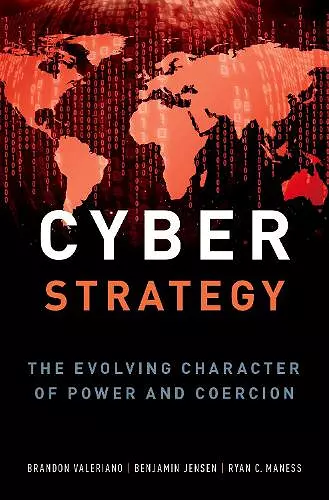Cyber Strategy
The Evolving Character of Power and Coercion
Benjamin Jensen author Brandon Valeriano author Ryan C Maness author
Format:Hardback
Publisher:Oxford University Press Inc
Published:28th Jun '18
Currently unavailable, and unfortunately no date known when it will be back

Some pundits claim cyber weaponry is the most important military innovation in decades, a transformative new technology that promises a paralyzing first-strike advantage difficult for opponents to deter. Yet, what is cyber strategy? How do actors use cyber capabilities to achieve a position of advantage against rival states? This book examines the emerging art of cyber strategy and its integration as part of a larger approach to coercion by states in the international system between 2000 and 2014. To this end, the book establishes a theoretical framework in the coercion literature for evaluating the efficacy of cyber operations. Cyber coercion represents the use of manipulation, denial, and punishment strategies in the digital frontier to achieve some strategic end. As a contemporary form of covert action and political warfare, cyber operations rarely produce concessions and tend to achieve only limited, signaling objectives. When cyber operations do produce concessions between rival states, they tend to be part of a larger integrated coercive strategy that combines network intrusions with other traditional forms of statecraft such as military threats, economic sanctions, and diplomacy. The books finds that cyber operations rarely produce concessions in isolation. They are additive instruments that complement traditional statecraft and coercive diplomacy. The book combines an analysis of cyber exchanges between rival states and broader event data on political, military, and economic interactions with case studies on the leading cyber powers: Russia, China, and the United States. The authors investigate cyber strategies in their integrated and isolated contexts, demonstrating that they are useful for maximizing informational asymmetries and disruptions, and thus are important, but limited coercive tools. This empirical foundation allows the authors to explore how leading actors employ cyber strategy and the implications for international relations in the 21st century. While most military plans involving cyber attributes remain highly classified, the authors piece together strategies based on observations of attacks over time and through the policy discussion in unclassified space. The result will be the first broad evaluation of the efficacy of various strategic options in a digital world.
This hugely important work needs to be an inspiration for future works across the cyber field. Nuanced, subtle, and extremely well written, the work aims to explain what cyber strategy may actually be, how it comes in diverse forms not only across issue areas but across state interests, and whether or not cyber really does signal an entirely new and different era in warfare. Summing up: Essential. * M. D. Crosston, CHOICE *
Cyber Strategy makes a compelling case that our new age of connectivity is also one of vulnerability. Not only due to the potential for disruption of democratic processes and theft or ransoming of valuable information. But also because many nations believe, perhaps mistakenly, that they can commit predatory acts in cyberspace — to spy, extort, or simply inflict costs upon others — with little fear of escalation to wider warfare. Valeriano, Jensen, and Maness examine these and other issues in cyber strategy, rigorously and unflinchingly. * John Arquilla, Distinguished Professor of Defense Analysis, United States Naval Postgraduate School *
The United States is dangerously insecure in cyberspace and we are at great risk from both nation state adversaries and non-state actors alike. This book provides a comprehensive analysis of the utility and efficacy of cyber coercion and great insight into how we can reevaluate cyber strategy. We hope to push the United States into a position where we can defend our nation and, if required, impose costs on our adversaries, serious work like Cyber Strategy provides a solid foundation for these efforts. * Mike Gallagher, , U.S. Representative for Wisconsin's 8th Congressional District *
In a new era of cyber coercion, we have more to fear from state-backed botnets manipulating our social media feed than from cyber bombs destroying our electric grid. "Avoiding both hype and complacency, this important book uses empirical evidence to illuminate the strategies of disruption, espionage, and degradation that threaten us, and to outline what we can do about it."-Joseph S. Nye, Jr., author of The Future of Power
Cyber Strategy brings together a tremendous amount of emerging research in the field of cyber conflict, tying theory to observed campaigns and data sets to tackle the big questions. Valeriano, Jensen, and Maness clearly lay out their hypotheses and evidence on the behavior of the main cyber powers (Russia, China, and the United States) and the dynamics of the conflict between them."-Jason Healey, Senior Research Scholar, School of International and Public Affairs, Columbia University
- Winner of 2019 CHOICE Outstanding Academic Title.
ISBN: 9780190618094
Dimensions: 160mm x 236mm x 28mm
Weight: 544g
320 pages